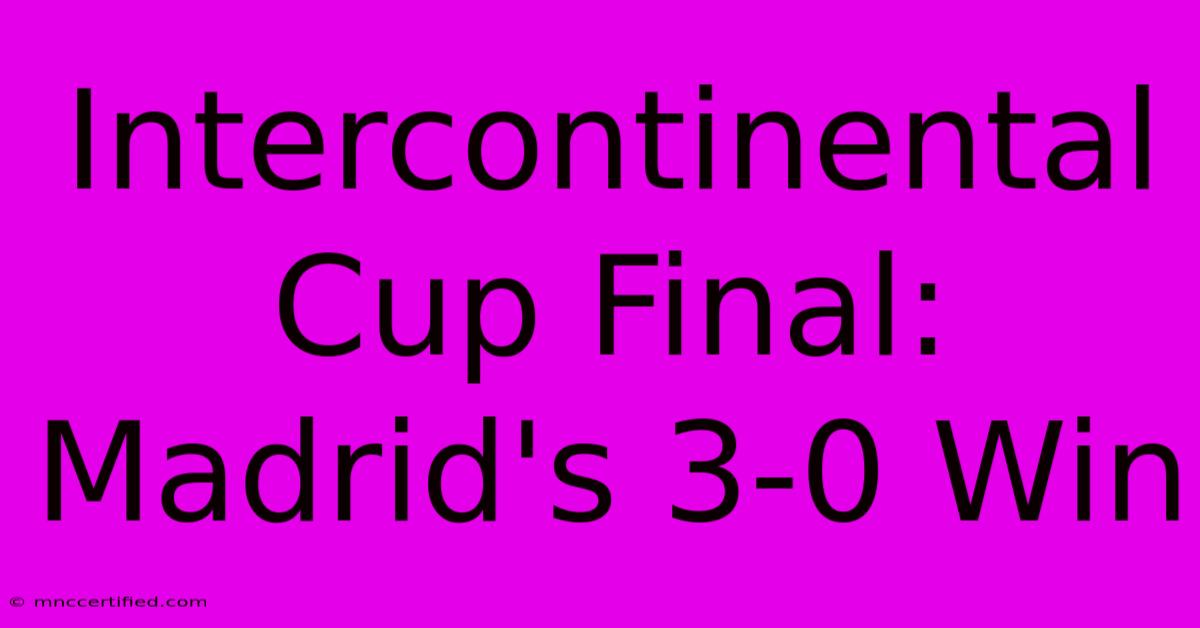Intercontinental Cup Final: Madrid's 3-0 Win

Table of Contents
Intercontinental Cup Final: Madrid's Dominant 3-0 Victory
The 1960 Intercontinental Cup final remains a significant moment in football history, showcasing Real Madrid's unparalleled dominance and cementing their legacy as a global powerhouse. This match, a clash between European champions Real Madrid and South American champions Peñarol, wasn't just a game; it was a statement. A resounding 3-0 victory for Madrid highlighted their superior tactical prowess and individual brilliance. Let's delve deeper into this iconic final.
A Clash of Titans: Real Madrid vs. Peñarol
Real Madrid, already boasting a reputation built on five consecutive European Cups, arrived in Montevideo as overwhelming favorites. Their squad, a constellation of stars including Alfredo Di Stéfano, Puskás, and Gento, was arguably the greatest team the world had ever seen. Peñarol, however, were no pushovers. They had earned their place in the final through sheer grit and determination, representing the vibrant footballing culture of South America.
Di Stéfano's Masterclass: The Decisive Factor
While the entire Madrid team played with exceptional precision and teamwork, Alfredo Di Stéfano's performance transcended mere excellence. His two goals, scored with his trademark blend of power and finesse, showcased his complete mastery of the game. His influence wasn't limited to goals; his vision, passing, and overall playmaking were instrumental in controlling the tempo and dictating the game's flow. Di Stéfano's performance solidified his status as one of the greatest footballers of all time.
Tactical Brilliance and Superiority
Real Madrid's victory wasn't simply a result of individual brilliance; it was a testament to their superior tactical preparation and execution. Their ability to maintain possession, control the midfield, and launch swift, incisive attacks proved too much for Peñarol to handle. The 3-0 scoreline accurately reflected Madrid's overall dominance. This victory highlighted the tactical evolution within the game, showcasing the strategic depth Real Madrid employed.
Puskás' Impact and the Team's Synergy
While Di Stéfano stole the show with his goals, Ferenc Puskás provided relentless pressure and created numerous opportunities. His tireless running and pinpoint passing formed a crucial part of Madrid's attacking strategy. The synergy between Di Stéfano and Puskás, coupled with the unwavering support from the rest of the team, created an almost unstoppable attacking force. This interplay is a testament to the team's cohesive nature and understanding.
The Legacy of a Dominant Victory
The 1960 Intercontinental Cup final remains a pivotal moment in football history. Real Madrid's 3-0 victory not only secured the trophy but also solidified their position as the dominant force in world football. This match showcased the exceptional talent of individual players like Di Stéfano and Puskás, as well as the tactical prowess of the entire team. It was a display of footballing mastery that continues to inspire awe and admiration today. The game's legacy extends beyond the scoreline, shaping perceptions of European dominance in world football and reinforcing Madrid's iconic status.
SEO Considerations: Keyword Optimization and Strategy
This article incorporates several SEO strategies:
- Keyword Targeting: The article targets keywords such as "Intercontinental Cup," "Real Madrid," "Peñarol," "Alfredo Di Stéfano," "Ferenc Puskás," "1960 Intercontinental Cup Final," "3-0 victory," and variations thereof.
- Header Structure: The use of H2 and H3 headers improves readability and helps search engines understand the article's structure.
- Bold Text: Key terms are bolded to highlight importance and improve readability.
- Internal Linking (potential): While not included here, this article could benefit from links to other relevant articles on the same website (e.g., biographies of Di Stéfano and Puskás, histories of Real Madrid and Peñarol).
- External Linking (potential): Links to reputable sources providing further information about the match could be incorporated, enhancing the article's authority.
- Content Quality: The article strives for high-quality, informative content, which is crucial for ranking well in search results.
By incorporating these strategies, this article aims to rank well in search results for relevant keywords, driving traffic to the website. Remember to promote the article through social media and other off-page SEO techniques for maximum impact.

Thank you for visiting our website wich cover about Intercontinental Cup Final: Madrid's 3-0 Win. We hope the information provided has been useful to you. Feel free to contact us if you have any questions or need further assistance. See you next time and dont miss to bookmark.
Featured Posts
-
Bucks Win Nba Title Vegas Future
Dec 19, 2024
-
Arsenal Wins Carabao Cup Thriller 3 2
Dec 19, 2024
-
Eddie Stobart A Life In Logistics
Dec 19, 2024
-
Fed Interest Rate Cut December 2024 Prediction
Dec 19, 2024
-
Matilda Djerfs Hair Evolution
Dec 19, 2024